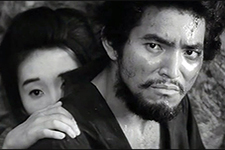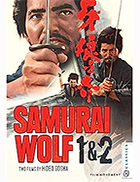Samurai Wolf II: Hell Cut (Kiba Ôkaminosuke: jigoku giri)
|  If Samurai Wolf (Kiba Ôkaminosuke) was a gruff B-movie spin on the traditional chambara (historical sword-fighting film), then its sequel, Samurai Wolf II: Hell Cut (Kiba Ôkaminosuke: jigoku giri), is an even gruffer and more cynical takedown of romanticized notions of chivalry and honor. Set in a desert wasteland that makes its depiction of feudal Japan feel all the more desolate and violent, Samurai Wolf II again find the titular ronin, Kiba Ôkaminosuke (Isao Natsuyagi), wandering alone before getting caught up in a complex feud of violence, greed, and corruption, this time involving a gold mine. Like most good sequels, Samurai Wolf II deepens our understanding of the protagonist and builds on what was good in the first film. Here, we learn more about Kiba, who was a largely enigmatic character in the first film. In the second film, we learn about his childhood, namely that he was the son of a wandering sword-master who made money by challenging other swordsmen, a career that was bound to end in his death at some point. The flashbacks to Kiba’s tragic childhood are motivated by his happening across an escort that is transporting three prisoners in bamboo cages, one of whom is a samurai named Magobei (Ko Nishimura) who was tricked into committing murder and who also looks just like Kiba’s dead father. The dynamic between Kiba and Magobei becomes the film’s central tension, as there is much to admire about the older samurai even though he is a deeply cynical and corruptible figure who represents precisely how Kiba could turn villainous (“Money buys everything, even a man’s heart,” Magobei says at one point. “One day, you will be like me.”). The hope, of course, is that Kiba will resist such temptation, since, despite his rough exterior and apparently amorality, he is a man of honor who always fights for the downtrodden and the victimized (in the film’s opening scene, he saves a distressed young woman from a group of men chasing, harassing, and likely planning to rape her). Samurai Wolf II also feature a more conventional villain: Higasa, the leader of a group of bandits who tricked and betrayed Magobei and is hiding a secret gold mine that he plans to exploit for himself. Higasa offers clear-cut villainy with few redeeming qualities, although we do learn later that the young woman Kiba saved in the opening scene is his mentally ill daughter who he protects even at his own risk. For good measure, the film also involves a dojo master who is intent on defeating Kiba, whose unconventional sword-wielding skills rival (and therefore threaten) his own. If the stakes feel higher in Samurai Wolf II, it is partly because the plot is more complicated and partly because the moral demarcations are murkier and harder to discern. Kiba is also at greater risk here. In the first film it often felt like nothing could touch him; he was the Japanese samurai equivalent of Clint Eastwood’s Man With No Name, whose Sergio Leone-directed Dollars spaghetti western trilogy was clearly an influence on Gosha’s approach to the chambara genre. In Samurai Wolf II, Kiba spends a good portion of the film’s second half strung up and left to die by Higasa, which underscores his mortality and humanity (his escape is almost entirely by luck). The narrative momentum builds more intensely here, resulting in a climactic standoff in which multiple characters are in danger and there is no real clarity of approach. Like the dusty terrain within which the action unfolds, nothing is clear and there is no possibility of a complete and harmonious resolution.
Copyright © 2023 James Kendrick Thoughts? E-mail James Kendrick All images copyright © Film Movement Classics | |||||||||||||||||||||||||||||
Overall Rating: 


 (3.5)
(3.5)


